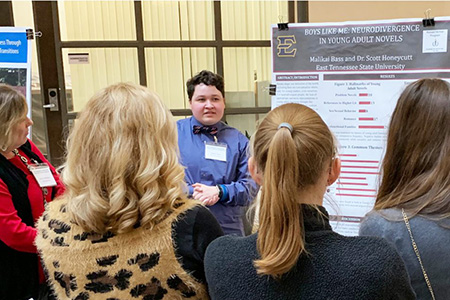Vanderbilt Kennedy Center's (IDDRC, UCEDD, LEND) LEND Self-advocate Trainees Learn from and Demonstrate the Benefits of Inclusive Environments
May 13, 2019

|
The definition and purpose of disability inclusion is to be sure that everyone has the same opportunities to participate in every aspect of life to the best of their abilities and desires. In the 2018-19 academic year, the Vanderbilt Kennedy Center (IDDRC, UCEDD, LEND) Consortium LEND (VCL) Training Program through the Vanderbilt Kennedy Center welcomed two self-advocates to their cohort of trainees for the first time.
VCL leadership collectively and enthusiastically shared that "the self-advocates provide insights and views from a perspective that can easily be dismissed or assumed by professionals. From the interprofessional trainees' perspectives, personal experiences and relationship-building with the self-advocates increases their own understanding, knowledge, and levels of empathy. At the same time, the self-advocates increase their leadership knowledge and skills, in addition to self-determination skills that assist them in becoming strong voices in their own communities."
Well into their second semester, trainees Malikai Bass and Avis Lee shared with us why they were drawn to apply to the LEND program, what they have gained from the trainee experience so far, and what's next for them.
Why did you decide to apply to the Vanderbilt Consortium LEND Program?
Malikai Bass: I learned about the LEND program through Dr. Cynthia Chambers (who serves as LEND associate director at East Tennessee State University in Johnson City). I work with her at a local organization Power of Performing Arts and she thought I would be interested in applying.
Avis Lee: My mother works at Vanderbilt and has previously been a part of the University of Wisconsin-Madison LEND program. With her suggestion and with my desire to improve in self-advocacy and leadership skills, we felt it would be a good fit.
How has the program helped you to grow professionally?
MB: I have learned so much about different professions, which has helped me to grow in my ability to advocate for others. Before, my perspective was limited to my experience and resources I had found on my own. Through the program I have learned a lot about other conditions and services. Further, the field I am intending to go into, Museum Education and Program Development, uses a lot of team and group-based projects. You have a board of directors and they all have different roles and connections and even jobs outside of being board members. Being in LEND I have learned to work in interprofessional groups which will be so helpful.
AL: The LEND program has helped me to think more critically about various topics, something that has only aided me for my own college writing and assignments.
How has the program helped you to grow personally?
MB: It helped me value myself as a self-advocate more. Before when I disagreed with opinions, I didn't feel qualified to correct people even if I was sure I was right. I didn't know how that conversation would go. But LEND has taught me strategies for having that conversation and has given me space to practice.
AL: It's given me a better perspective on various disabilities and different fields of the medical field. Not to mention, it will likely help me recommend options for others with autism and similar disabilities.
What's next for you?
MB: I am actually an undergraduate student, as opposed to my fellow trainees who are graduate students. I am going to be a senior next year, so I will be applying to graduate schools. I am really hoping to attend George Washington University's museum education program, because they are really involved in advocacy and social change. I am also giving more time to be a professional self-advocate. I have four guest lectures booked before the end of the semester, and I am presenting research at four conferences. I want to make sure that people with disabilities are involved in the decision-making process at every level: from individual decisions to federal policy.
AL: More college, honestly. I'm still a college sophomore/second year, and the only real way to apply these is to get to graduation and enter a field where my newfound leadership skills can make a difference!
Malikai Bass is a student at East Tennessee State University.
Avis Lee is a student at Nashville State Community College.
Courtney Taylor is director of VKC Communications.







